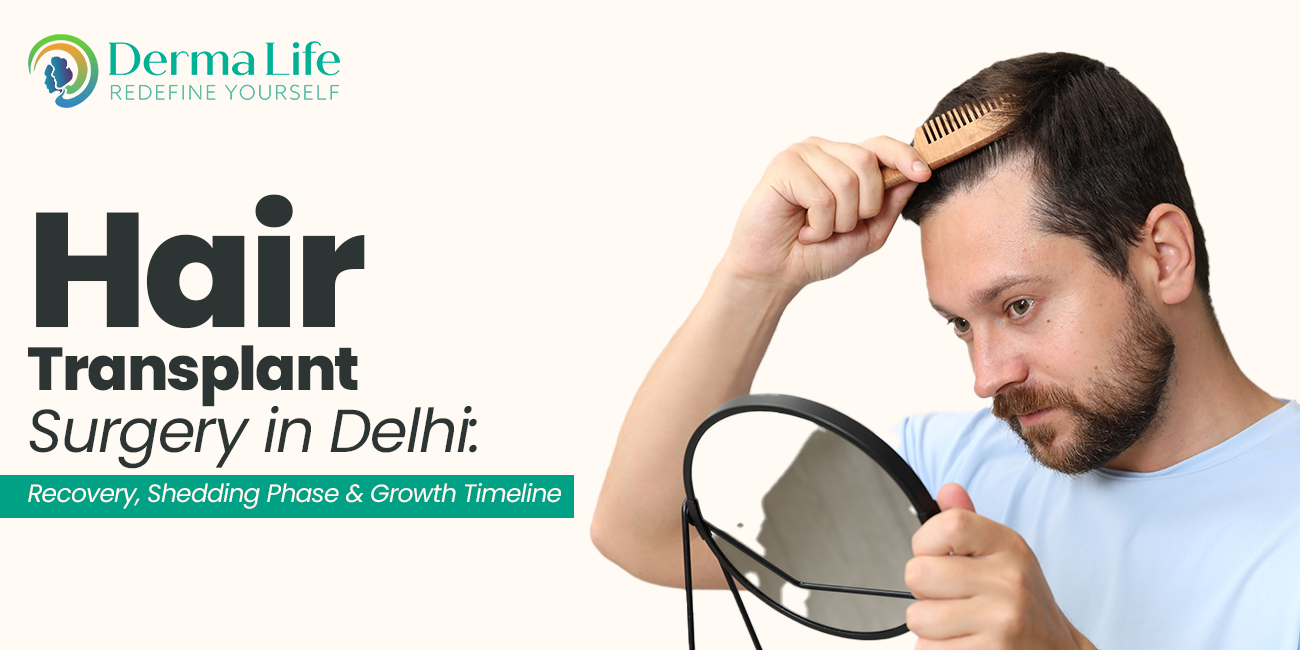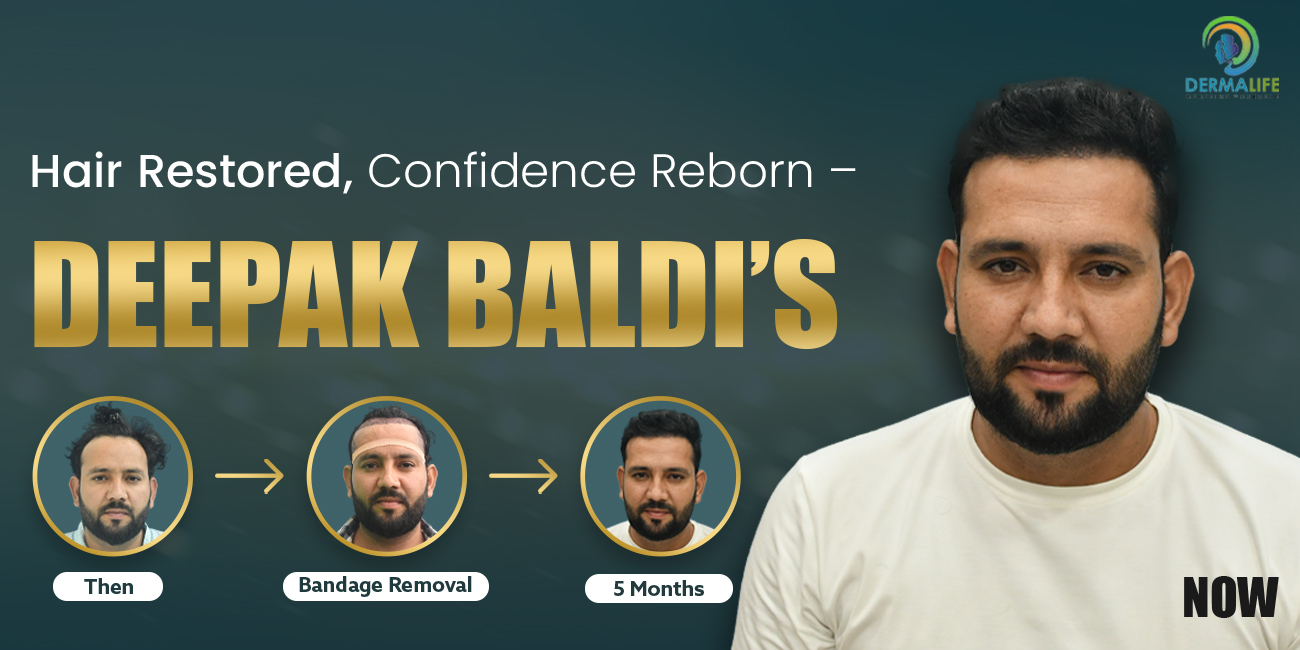Losing about 100 strands per day is normal, but losing more than that can be a sign of concern for many people. There is a difference between hair fall as well as hair loss, as hair fall is a common phase of the hair growth cycle, and hair loss indicates something is impairing the growth cycle. If you have hair fall, you will lose your hair strands, and hair loss is a more advanced phase where you are not just shedding hair but also losing its density. If you are looking for the right person to treat your hair loss, it’s vital to understand the facts to get the best treatment available. As there are many possible causes of hair loss, it’s essential to get an accurate diagnosis, and this is why consulting an expert dermatologist in Delhi is the best option.
Hair loss and its types
Hair loss is mainly caused by a disturbance in the body’s hair production cycle.
When a person experiences more shedding of hair strands than normal and does not grow back, the condition is considered alopecia. A hair growth cycle has three phases, the initial phase is known as the anagen phase, which lasts for years; the second phase is the catagen phase, which lasts for about ten days and which hair stops growing and separates from its follicles; and the last stage is the telogen phase, the follicles. It rests for about two to three months, and then the hair falls out. After the third phase, the anagen phase again starts as new hair grows in the same follicle. If this cycle is disturbed or if hair follicles are damaged, hair may begin to fall out more quickly than regenerated, leading to hair loss symptoms like hair falling in patches or overall thinning. However, there are many types of hair loss, and it can affect kids and adults of any gender. You may also lose hair on your head and from any body parts. Some types of hair loss are :
- Androgenic alopecia
It is a hereditary baldness that can affect anyone, irrespective of gender.
- Alopecia areata
It is an autoimmune condition that leads to severe hair loss
- Telogen effluvium
It is a type of hair loss that consists of rapid shedding of hair in a short amount of time, which happens in a few months.
- Anagen effluvium
It is also a type of hair loss that is very rapid and occurs because of specific medical treatments like chemotherapy.
Hair loss symptoms
Hair loss occurs gradually or suddenly for numerous reasons; some hair loss symptoms and signs are listed below :
- If you part your hair and notice that it may widen, it is an indication of thinning hair.
- If your hairline looks higher than normal, it may be a sign of thinning hair.
- Circular or otherwise patchy bald spots on the scalp, brows, or beard can also be itchy or painful.
- Gradual thinning on top of the head is known as male pattern baldness. Female pattern baldness is characterized by thinning hair on top of the head, spreading to the entire head.
- Sudden loosening of hair that is caused by physical and mental shock.
- Intense itching, burning, and tenderness in the scalp
- Scaly bald patches, often with sores or blisters that open and have pus
- Patches of psoriasis on your scalp
- Complete hair loss of the full body
The hair loss symptoms and signs a person develops depend on its cause, so it is best to consult a dermatologist immediately, as they will evaluate the root cause of hair loss and offer treatment accordingly.
Hair loss causes and its risk factors
Hair loss, whether a person notices thinning hair or baldness, can happen for several reasons. The condition is common and is a side effect of a health problem that needs to be addressed immediately by consulting the best dermatologists. If you experience severe hair thinning or baldness, you must visit a dermatologist to determine the underlying cause of hair loss and to learn ways to stop hair loss. However, male and female pattern baldness are some of the primary causes of hair loss, but it may also be because of several other conditions or lifestyle factors. Hair loss can be caused by many factors:
Genetics is the cause of hair loss and is also known as hereditary hair loss.
- Fungal infection
- Tight hairstyles
- Hormonal changes occur because of pregnancy, childbirth, or menopause.
- Some medical treatments, like chemotherapy
- Some stressful events or physical trauma
- Thyroid condition
- Certain medications are taken for common health issues.
- Various types of Alopecia Areata, which is an autoimmune condition.
- Stress
- Trichotillomania
- Nutritional deficiencies
- Extreme hair care, like shampooing and blow-drying hair too much
There are certain risk factors for hair loss as well. You are at high risk of experiencing severe hair loss if :
- You have a family hair loss history
- You are pregnant, and due to hormonal changes, your hair to falling out
- You take prescription medications
- You have certain medical conditions,
- You have poor nutrition
Hair loss diagnosis
Dermatologists are not just concerned about skincare but also specialize in hair care. They diagnose and treat many types of skin as well as hair disorders. When it comes to hair, a dermatologist will determine the root cause of hair loss. After diagnosing the issue, they will evaluate what type of hair loss is occurring and recommend the best treatment for you. Consulting the best dermatologist in Delhi will give you both a diagnosis and hair loss treatment, and the main goal of the expert is to know the reasons for thinning or loss of hair growth. They will diagnose hair loss by :
- Doing a physical examination of the scalp
- By recommending a hair pull test, and may also use a card test to examine the density and shape of your hair strands.
- They may recommend blood tests, scalp biopsy, trichoscopy, and many other evaluations to determine hormonal imbalances, vitamin or mineral deficiencies, and other diseases and medical conditions that may cause hair loss.
- Dermatologists may also recommend some extra tests, like blood tests for iron deficiency or thyroid problems, and fungal culture tests for fungal infection.
All the above factors are necessary to know the leading cause of your hair loss, which will give clues to your dermatologist about your scalp and overall health. Accordingly, they will recommend the perfect treatment option for you.
Treatment options for hair loss
Many effective hair loss treatment options are available that can effectively reverse hair loss or at least slow it. Treatment options for hair loss range from medication to hair transplant surgery. Some of the best hair loss options are :
- Medications
It is the treatment option if an underlying health issue causes hair loss. If this is the problem, your dermatologist will recommend stopping taking it for a few months. They will also prescribe medications to treat pattern baldness and common hair loss. They treat hair loss with minoxidil, finasteride, or any other medications. The type of medication prescribed by the dermatologist will depend on your:
- Hair loss causes
- Overall health
- Age
- Expected results
- Plans for getting pregnant
- Hair transplant surgery
It is another effective option for hair loss or hair thinning issues and treats permanent hair loss if only the top of the head is affected. Hair transplants are an effective hair restoration surgery done by an experienced dermatologist and surgeon. The process involves the removal of hair from a part of the head that has hair and transplanting it to the bald area. Each patch of hair has many hairs, and sometimes, larger hair strips containing many hair groupings are taken. The procedure is widespread, effective, and preferred, so it does not require hospitalization.
- GFC
It is a medical process in which the growth factors are injected into the scalp to reach the hair roots. This treatment may take 1-2 hours, depending on the number of scalp locations being treated. Although this process is non-invasive and painless, some patients may experience mild pain. To know more about GFC, read our other article entitled “GFC Hair Treatment- Benefits & Success Rate”.
Tips that help prevent preventable types of hair loss
Damaged hair is more at risk of breakage, so it tends to break. Hair breakage leads to frizzy, unhealthy-looking hair. You may see thinning hair or even bald spots if you carry out things that damage your hair. There are certain lifestyle changes that you can make to avoid hair loss. The best way to pinpoint the issues is to find effective ways to resolve them. Some changes that may help you with hair loss are :
- Review hairstyles and avoid tight styles and products that cause alopecia.
- Choose products wisely and according to your scalp skin.
- Seek ways to reduce stress or remove stressful situations.
- Check on your diet, as many hair losses are caused by an improper diet. Some diets lack vital minerals and vitamins required for consistent hair growth.
If these lifestyle changes do not help you get healthier hair or do not stop hair thinning and hair fall, you may want to see a dermatologist. There is a possibility that your hair care may not be the root cause of your problem. Consulting a dermatologist is vital if you are concerned about thinning hair or hair loss. Most causes can be stopped or treated, and effective hair loss treatment options can help you manage, slow down, or address the hair loss and offer better and desired results.
When to see a doctor for hair loss
With an accurate diagnosis, many people with hair loss can see regrowth. If you require regrowth treatment, the earlier you start, the more likely you will get great results. With many medical and in-office procedures available, expert dermatologists can help improve your hair. You must visit your dermatologist to comprehensively reevaluate your hair and any skin concerns.
The Trichologist at Dermalife, one of the best skin and hair care clinics in Delhi, will check your scalp and effectively treat it. It is among the most trusted hair transplant clinics in Delhi, offering many effective treatments for all kinds of hair loss. However, Hair transplant surgery is the best option to treat hair loss and is often the last hair loss treatment option for patients with scarring alopecia. If you have severe, permanent damage to the follicles or those with pattern baldness, you can benefit from surgery. You will be the best candidate for the procedure if you have sufficient areas of healthy hair growth on your head.
To get started with your hair transplant journey with a trusted Trichologist in Delhi, schedule your consultation with Dr. Gaurav Garg, one of the best hair transplant surgeons in Delhi.





